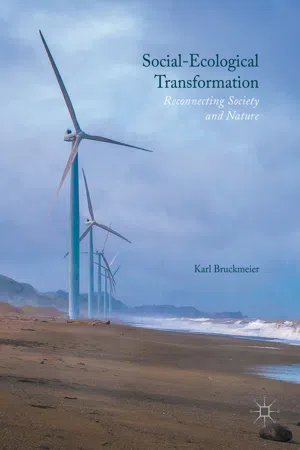- The ontological components of worldviews and paradigms
- The epistemological questions of knowledge generation, synthesis, and application with the help of the theory
- The methods of theory construction, especially the differences between a holism ex ante, as in the case of systems theory, and a holism ex post, as in the kind of critical theories of society
- The normative criteria guiding the construction of the theory and its application, including ethical criteria of a theory connecting humans, society, and nature

- English
- ePUB (mobile friendly)
- Available on iOS & Android
About This Book
This book advances a social-ecological theory to reconnect nature and society through sustainable transformation of interacting social and ecological systems. Social ecology develops as an interdisciplinary science by using knowledge from the social sciences, especially sociology and economics, and from natural-scientific ecology. Knowledge integration across the boundaries of social and natural sciences is not widespread, blocked by the specialisation of theories and their competing forms of explanation and interpretation. Chapters in this book describe a new social-ecological theory that connects concepts and theories from both sides to create a new interdisciplinary theory. Inter- and transdisciplinary knowledge synthesis creates possibilities to analyse global environmental problems more systematically by integrating specialized research on environmental problems. The author uses social-ecological theory to analyse and explain problems and processes of global change in modern society such as climate change and adaptation to it, ecosystem change, and transformation of the industrial energy regime, finally offering pathways of transformation to a future sustainable society.
Frequently asked questions
Information
1. Introduction: Developing Social-Ecological Concepts and Theories
Table of contents
- Cover
- Frontmatter
- 1. Introduction: Developing Social-Ecological Concepts and Theories
- 2. Interaction of Society and Nature in Sociology
- 3. Interaction of Nature and Society in Ecology
- 4. Sustainability in Social-Ecological Perspective
- 5. Social-Ecological Systems and Ecosystem Services
- 6. Knowledge Transfer Through Adaptive Management and Environmental Governance
- 7. Climate Change and Development of Coastal Areas in Social-Ecological Perspective
- 8. Transformation of Industrial Energy Systems
- 9. Conclusion: The Coming Crisis of Global Environmental Governance
- Backmatter